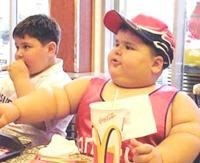Child Obesity Can Cause Numerous Health And Emotional Problems
If you are concerned your child may be obese set an  appointment with your family doctor for a screening and diagnosis. The doctor can calculate your child’s body mass index and determine where it falls on the national BMI-for-age growth chart. The BMI-for-age growth chart indicates if your child is overweight for his or her age and height. The doctor can determine your child’s percentile, which means how your child compares to other children of the same sex and age.
appointment with your family doctor for a screening and diagnosis. The doctor can calculate your child’s body mass index and determine where it falls on the national BMI-for-age growth chart. The BMI-for-age growth chart indicates if your child is overweight for his or her age and height. The doctor can determine your child’s percentile, which means how your child compares to other children of the same sex and age.
These growth charts are established by the Centers for Disease Control and Prevention and help to identify overweight children. If your child’s BMI-for-age is between 85th and 95th percentiles, he or she is at risk of being overweight. If your child’s BMI-for-age is over the 95th percentile, he or she is overweight.
Your doctor will factor in things like being muscular or having a larger-than-average body frame because the BMI does not consider these things. Growth patterns vary greatly among children and are another factor the doctor will consider before making an overall weight assessment.
During this assessment the doctor will probably also take into consideration the following:
•Your family’s history of obesity and weight-related health problems like diabetes
•Your child’s eating habits and calorie intake
•Your child’s activity level
•Other health problems your child may have
It is probably a good idea to take along a notebook with the above information to have ready for your doctor at the time of the weight assessment. Keep a record of what your child eats for a two week period to give to your doctor for his review.
Obesity in children is a serious health problem that can result in diabetes and heart disease. Review the following health problems that can result from children being overweight:
•Type 2 diabetes
•Metabolic syndrome
•High blood pressure
•Asthma and other respiratory problems
•Sleep disorders
•Liver disorders
•Liver disease
•Early puberty or menarche
•Eating disorders
•Skin infections
•Heart disease
A child who is overweight may also suffer from social and emotional problems that include:
•Low self-esteem and bullying. Other children often tease and bully overweight peers.
•Depression, which can occur from peer teasing and harassing
•Behavior and learning problems: Overweight children tend to have more anxiety and poor social skills, which can lead to acting out and/or other disruptive behavior in the classroom. When children are overweight they also tend to be more social withdrawn.
Source: Mayo clinic (2006)
Disclaimer: This article is not meant to diagnose, treat or cure any kind of a health problem. Always consult with your health care provider about any kind of a health problem.
This article is FREE to publish with the resource box. This article was written (2-2007).
About the Author
Connie Limon. Please visit us at http://nutritionandhealthhub.com and sign up for our weekly health and nutrition tip. Articles are FREE to publish to your newsletters, website or blog.
Jul 19, 2008
Child Obesity Can Cause Numerous Health And Emotional Problems
Tags:
Labels: Child Obesity, Emotional Problems
Subscribe to:
Post Comments (Atom)
No comments:
Post a Comment